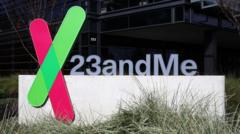In recent years, 23andMe, which once boasted a share price exceeding even that of tech giant Apple, now finds itself grappling with a drastic fall in value and market uncertainty. After enjoying a meteoric rise, attracting millions of customers eager to delve into their ancestry and genetic health, the company’s stock has tumbled from an all-time high of $321 to under $5, placing its survival in jeopardy. Industry experts cite a lack of a sustainable business model and the long timeline for profitable drug research as major factors contributing to this downfall.
Struggles of 23andMe: A DNA Testing Giant at the Crossroads

Struggles of 23andMe: A DNA Testing Giant at the Crossroads
As the DNA-testing pioneer 23andMe fights against significant financial decline, critical questions of customer data protection arise.
With the company’s board largely absent and speculation swirling about a potential sale or closure, 23andMe’s co-founder and CEO, Anne Wojcicki, remains adamant about taking the company private, dismissing takeover bids. The rising concerns extend beyond business viability: the company holds extensive and sensitive genetic data on individuals, including those of relatives who did not consent to such disclosure, raising alarms over privacy and data security.
Industry analysts emphasize the unique challenges that DNA data poses; breaches can lead to more severe ramifications compared to other types of personal information. 23andMe asserts it is committed to safeguarding customer data and complying with privacy laws, though previous incidents of hacking contribute to persistent unease surrounding its database. As debates around data protection intensify, experts call for a reassessment of how personal information is managed and safeguarded in the ever-evolving tech landscape.
Industry analysts emphasize the unique challenges that DNA data poses; breaches can lead to more severe ramifications compared to other types of personal information. 23andMe asserts it is committed to safeguarding customer data and complying with privacy laws, though previous incidents of hacking contribute to persistent unease surrounding its database. As debates around data protection intensify, experts call for a reassessment of how personal information is managed and safeguarded in the ever-evolving tech landscape.























